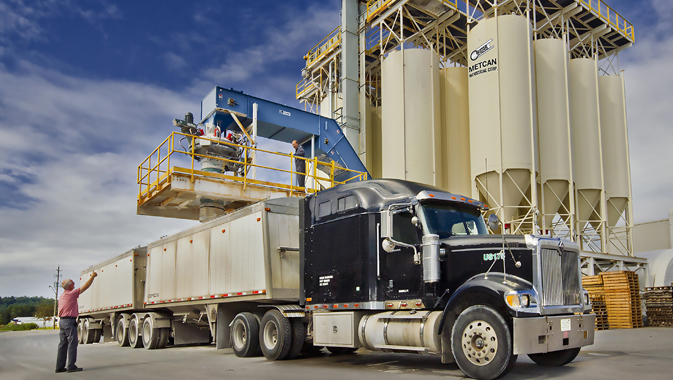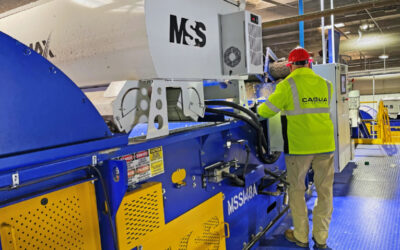Since its incorporation a quarter century ago, Metcan Industrial Corp. has proven itself to be a recognized leader in the production and distribution of high-quality, custom-blended synthetic slag for use by the steel industry.
~
The company’s products are made to order utilizing state-of-the-art technologies to ensure consistency. The custom blends are manufactured to incredibly tight tolerances at Metcan’s three facilities to standards so exacting that they rival pharmaceutical levels, an achievement virtually unheard-of in the industry.
Metcan Industrial Corp. has invested millions of dollars in infrastructure, property and the latest equipment at its manufacturing facilities located in Stoney Creek, Ontario; Selkirk, Manitoba; and most recently, Adrian, Michigan. The investments permit Metcan to meet the needs of its many well-known and highly respected steel making customers, where the steel end use varies from military, automotive,civil / industrial construction and agribusiness; Fortune 50 companies such as Gerdau; Nucor Corporation; Evraz; Edmonton-based AltaSteel Ltd.; and Hamilton-based U.S. Steel Canada.
Privately owned and operated, Metcan can produce high volumes of custom-blended synthetic slag for customers of all sizes. Product is shipped in everything from small, 25-pound bags to massive tanker trucks. All synthetic slags are precisely formulated for the requirements of individual clients, with no ‘catalogue’ chemistries. Synthetic slags are typically based on calcium fluoride, calcium aluminate, calcium silicate or a combination of two or more fluxes.
Viscosity is precisely controlled to result in the right fluidity for coating ladle refractory systems. Metcan’s drive for quality ensures satisfaction among all its steel manufacturing clients. The company manufactures synthetic slags for steel grades with sulfur specifications ranging from as little as -10 ppm to as much as +2000 ppm.
“As far as I know, there are only three manufacturing facilities in the world like our plants, and those are our three plants,” says Dean McCann, president of Metcan Industrial Corp. McCann says that, combined, the company can produce close to 1,000,000 tons of product per year, “and the accuracy we can produce to, on a 4,000 pound bag, can be plus or minus four ounces,” he says. “The industry doesn’t demand that accuracy, so, in any one of our components, we have an internal demand of 0.5 percent, but we can bring it down to 0.05 percent if we want.”
When he formed the business back in 1990, McCann had a vision to build a company founded on innovation and the principles of honesty and integrity, while providing quality products to customers at a reasonable price. With a dedicated and loyal team of about twenty full-time staff, Metcan – which is a combination of the first part of his wife’s maiden name and the last part of McCann – operates in Canada as Metcan Industrial Corp. and in America as Metcan USA.
Prior to forming Metcan, twenty-five years ago, McCann worked for a similar business engaged in molten metals. He started as a production manager / plant manager and took on additional marketing responsibilities before being promoted to product development manager.
Deciding to set out on his own, McCann opened his first synthetic slag manufacturing plant in Edmonton, Alberta, in 1990. The manufacturing plant was relocated to Selkirk, Manitoba, in 1997 to streamline processes and improve the quality of products. This was soon followed, in 2003, by an on-site laboratory to test products and the construction of a second purpose-built plant in Stoney Creek, Ontario which enabled Metcan to boost its capacity tremendously. A bulk loading facility, in 2007, and the purchase of bulk trailers, in 2011, allowed the company to transport products to clients more efficiently.
In 2013, the decision was made to expand manufacturing into the United States, in response to increased demand for Metcan’s experience in high-quality synthetic slag solutions. Located in Adrian, Michigan, the company’s latest plant was commissioned in April of this year. At 40,000 square feet, and set on seven acres with plenty of room for future expansion, it is the largest of the company’s three facilities.
“We are in phase one now, which is the very first bank of eight silos,” says McCann. “Phase two will allow us to produce our product and ship it in bulk, rather than in a package format, and phase three will be introducing an additional eight silos.” It is anticipated that part of phase two will occur in 2015, with phase three set for 2016.
To best serve steel manufacturers, Metcan scouted and selected locations near its customer base and material suppliers. By locating its first plant in Manitoba, the company was able to serve both Alberta and Saskatchewan and expand to a steel plant in Minnesota. At present, the company’s operations in Canada supply into about 12,000,000 tons of steel production.
Its plant in Michigan, however, within a four-hour radius, will supply into about 17,000,000 tons of steel production. “The plant in Adrian has the market and the geography to be busier than both of our Canadian operations combined,” comments McCann.
In the steel industry, regular slag is typically a waste product and consists of naturally-occurring molten metal oxides (such as iron oxide or rust) that float to the surface when melting scrap metal. Metcan’s synthetic slags, however, alter the chemistry of the naturally-occurring slag. The company’s synthetic slags eliminate the adverse effects of the naturally occurring slag. Improved refractory performance, improved castability, absolute sulphur control as well as reduced costs are just some of the positive results observed with the use of Metcan’s synthetic slag.
“We are essentially changing the chemistry of the naturally-occurring slag in order to protect the refractory system and to improve the steel quality and steel cleanliness,” states McCann.
At Metcan, quality control starts long before the products are custom-blended and produced. To ensure only the best raw materials are used for synthetic slag formulas, ingredients are tested at the company’s facility upon arrival. One of the technologies used by Metcan for quality analysis is Energy-Dispersive X-ray Spectroscopy, often known as EDX (Bruker Ranger S2). The team can also test all raw materials or finished product for combined moisture using a Leco RC612 hydrogen / carbon determinator.
“This way, we can take a complete analysis of all of our raw materials coming in,” says McCann. “Once we know all of our inputs, and we can control the weights of each one of those products. We know mathematically what our output chemistry will be, but we also have the ability to test our material – the actual product – upon completion, almost as a double check, and all that can be done internally.” If the customer is requesting additional testing, other external services can be arranged including X-ray fluorescence (XRF), inductively coupled plasma (ICP) and energy-dispersive X-ray spectroscopy.
To further ensure quality, all of its production equipment is completely sealed from the environment, and the ability to completely blanket all raw materials and flood production equipment with air dried to -100F has been installed. All products are shipped in sealed Metcan containers. Manufacturing is entirely automated with software specially created for the company.
Metcan works five days a week, eight hours per day to operate a highly-efficient operation using lean manufacturing technologies. All receiving and production equipment is either PLC (Programmable Logic Contolled) or HMI (Human Machine Interface) controlled. Metcan is ISO 9001:2008 certified. With a minimum of 2,000 pounds per minute production capacity per facility (a remarkable combined manufacturing capacity of 2.2 billion pounds), Metcan’s three production facilities ensure customers of a guaranteed uninterrupted supply.
The company – which sources raw materials worldwide – produces impressive volumes of product in a very short time. A forty ton truckload of material can be made in about forty minutes. “This means that, if a customer calls us as far as lead time, our lead time is in minutes and hours, where some of our competitors and quasi-competitors, their lead time is counted in days and weeks,” says McCann. All formulations are custom-made for individual clients, and some inventory is carried for customers who have agreed-to inventory levels.
A focus on quality throughout and an extremely strong knowledge of the industry, manufacturing processes and chemistry have made for success. The company is celebrating its twenty-fifth anniversary in business and is looking at expanding its Adrian plant and other locations in the coming years. Metcan is committed to doing what it does best: focusing on the synthetic slag requirements of customers, timely delivery and unparalleled service and performance.
“Those are all things that sound like clichés, but really those are the building blocks of the company and the partnership that we build with both our suppliers and supply chain right through to our customers,” says company President McCann. “That’s really what Metcan’s focus is and the reasons why we have been as successful as we have been.”













